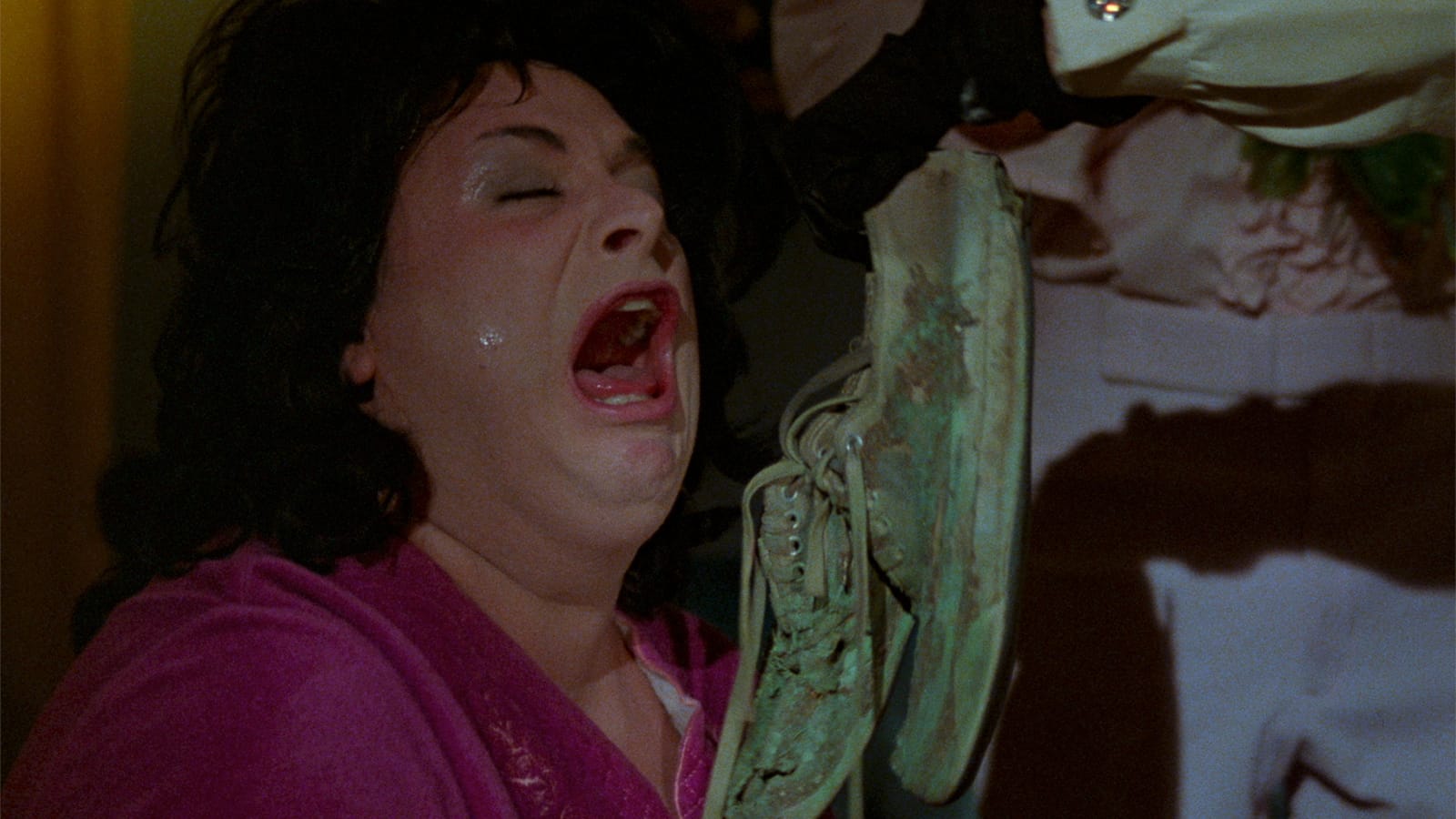Polyester

Remember those inane but innovative gimmicks that duped a movie audience into having the time of its life even when the movie stunk?
There was Percepto in William Castle’s The Tingler (1959), a device consisting of a buzzer rigged into selected theater seats which jolted viewers into believing that the critter of the film’s title (a dormant organism aroused by its host’s fright) was alive in their spinal columns. Less effective but more fun was Illusion-O, Castle’s gimmick for 13 Ghosts (1960) similar to 3-D glasses except that you could see the spools if you looked through the red lens but couldn’t if you looked through the green.
John Waters fondly remembered these gimcrack gimmicks and resuscitated them for his 1981 film Polyester, shot in fabulous Odorama. This, in the first above-ground picture made by the director of such subterranean dementia as Mondo Trasho (1969) and Pink Flamingos (1972), was a cinematic breakthrough more profound than Dolby sound or Cinerama. For an audience that previously had been olfactory-deprived, able only to SEE but not SMELL a movie, Waters provided special scratch-and-sniff cards enabling you to fill your nostrils with whatever scent or stench that the film’s heroine, Francine Fishpaw, was inhaling. These aromas, which ranged from the pungent perfume of pizza to the foul fragrance of flatulence, reinforced the film’s all-important moral: Some things in life just plain stink.
Francine Fishpaw (played by Waters’ longtime diva, the divine female impersonator Divine, aka Glenn Milstead) is a suburban housewife who wins the Woman’s Movie Trifecta, enduring alcoholism, juvenile-delinquent children, and divorce. Fortunately, V, as the title intimates, is a 100% unnatural comedy, a satire of middle-class America tickling the conventions of the mainstream domestic melodrama. It was the first of Waters’ Bourgeois Trash Trilogy that would later include the 1987 Hairspray and the 1990 Cry Baby, all films lampooning middle-class values.
Poor Francine Fishpaw. She lives on a secluded cul-de-sac in suburban Baltimore, a dead-end in more ways than one. Sure, Francine seems to have everything: the house, the husband, the Empire furniture upholstered in Jordan Almonds colors (white, lavender, pale pink). But she is having a Bad Air Day. For this woman with a nose keener than an anteater’s sniffs something rotten in her plush paradise.
Is it the moldy tomatoes thrown by the picketers outside her house, protesting her husband’s porn theater, currently playing the XXX-rated movie, My Burning Bush? Is it the cheap perfume worn by her slutty daughter, the one in the spandex disco pants and the Farrah Fawcett ‘do? Or is it the angel dust smoked by her punk (as in rocker AND delinquent) son, a foot-fetishist sought by the police for his serial crime of stomping the sandaled feet of pretty women?
There’s no one Francine can turn to for help or advice. Her mother is interested only in money. Her husband is busy diddling his secretary. Thus the vodka bottle becomes solace for Francine, a picture of full-figured pathos who looks as though she’s simultaneously channeling Liz Taylor, Anna Magnani, and Smirnoff.
Waters knows—and he knows that you know—that the convention of women’s movie melodramas dictates that she who has everything must be punished for being better off than those in the audience. Yet Francine suffers more than most. Her daughter comes home pregnant, with a straight-F report card. Her son is expelled for truancy, arrested for his foot-stomping, and sent off to what used to be called “the laughing house.” Then there’s her empty-bed blues. Could it get any worse? Imagine what it’s like for Francine to reach for a snort and find that her mother has handed her a jigger of gasoline!
For she who suffers, the woman’s movie melodrama also provides deliverance. Will Francine be saved by that hunk in the white Corvette, Todd Tomorrow (Tab Hunter)? He is the opposite of her philandering husband: attentive, tender, PLUS he runs a drive-in theater showing a triple-feature of films by Marguerite Duras, the highbrow novelist-feminist whose movies are as tedious and opaque as Waters’ are peppy and transparent.
With Todd, Francine enjoys a “Happy Interlude,” that montage sequence in the woman’s movie where everything goes right for the heroine. The couple horseplays feeding ponies, they chase butterflies, they take a roll in the hayloft. But Waters knows—and he knows that you know—that the “Happy Interlude” is just the upbeat prelude to the downbeat melodrama that inevitably follows.
Happily, Polyester has an unexpectedly cheerful resolution. Francine is reunited with her children who have learned that instead of committing crimes, they can make art about them. In the stale genre of woman’s movies, Polyester may not be a breath of fresh air, but it is definitely a waft of air freshener.




